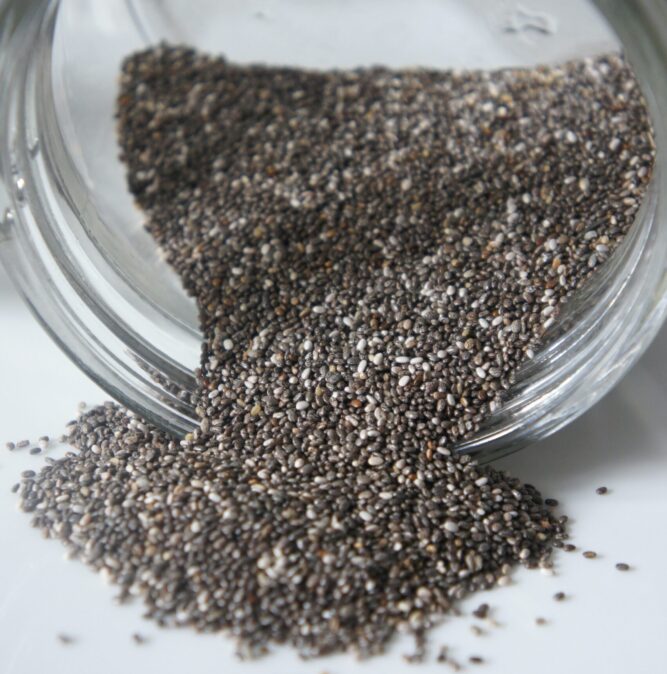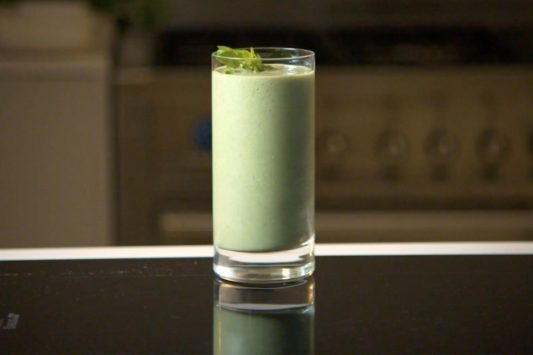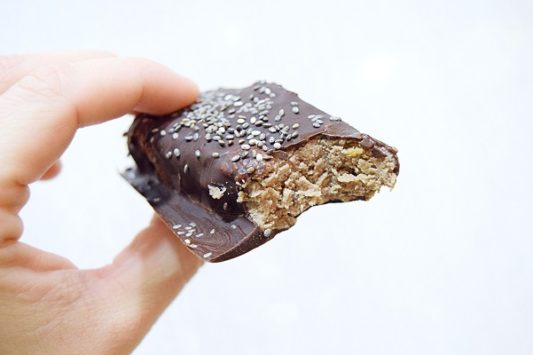WHAT IS CHIA SEED?
Chia seeds are small, nutrient-dense seeds derived from the plant Salvia hispanica, native to Mexico. They are known to have a mild, nutty flavour and can be consumed raw or added to various dishes such as smoothies, porridge, yoghurt, or baked goods.
In recent years, chia seeds have gained popularity as a superfood due to their rich nutritional profile. Superfoods are typically defined as foods packed full of essential nutrients. Considering chia seeds are rich in fibre, healthy fats, protein, vitamins, minerals, and antioxidants, it’s arguably one of the best superfoods.
Read on to explore the health benefits of chia seeds and discover the true extent of their superfood status!
WHAT ARE THE BENEFITS OF CHIA SEEDS?
1) CHIA SEEDS ARE A GREAT SOURCE OF FATTY ACIDS
Chia seeds are around 30% fat but are ‘good’ unsaturated and essential fatty acids omega-6 and omega-3.
Of honourable mention is the fact that 60% of the fatty acids in chia seeds are omega-3 fatty acids, which are important for cellular health and controlling inflammation. Consumption of omega-3 has been associated with a lower risk of cardiovascular disease, regulating cholesterol and lower cancer and diabetes risk and this has partly been attributed to the ‘good’ fats contained in chia seeds.[1]
Of course, unsaturated fatty acids associated with improved cardiovascular health are found in other foods. Olive oil for example has been shown to be very good for heart health. So then, are there any other things we ‘find’ in chia seeds that elevate it above the level of a humble ‘normal’ food?
2) CHIA SEEDS PROVIDE AN EXCELLENT AMOUNT OF PLANT-BASED PROTEIN
The answer to this is a resounding yes!
Chia seeds are also a good source of protein, containing 15-25g per 100g. Protein is key for muscle building, recovery from exercise, and overall health and well-being. Nuts and seeds are also important contributors to protein intake, especially for those who follow a plant-based diet.
However, chia seeds are especially excellent as a plant-based protein source as unlike many other plant sources they contain all the essential amino acids the body needs.
3) CHIA SEEDS CONTRIBUTE TO A HEALTHY GUT
Chia seeds also provide a considerable amount of dietary fibre, providing around 30-40g per 100g serving. The recommended daily fibre is suggested to be ~30g per day and this is something many people fall short of hitting in their daily needs. So, consuming chia seeds by adding them to meals is a great way to top up daily fibre intake.
Fibre intake is important for maintaining gut health, which not only helps support our digestive function, but a healthy gut has important implications for the immune system and has even been associated with better mental health.
4) CHIA SEEDS CONTAIN ANTI-INFLAMMATORY PROPERTIES
If containing essential fatty acids, fibre, and all the essential amino acids wasn’t enough to qualify chia seeds as a superfood, they also contain important vitamins, minerals and other active compounds that are known to benefit human health.
These active compounds include flavanols and phenolic acids, which are known to have anti-inflammatory and anti-cancer properties. Combined with the other ‘compounds’ in chia seeds is what makes them a super, health-promoting food.
HOW SHOULD YOU EAT CHIA SEEDS?
Chia seeds can be eaten ‘raw’, and are similar in taste and texture to poppy seeds. They can also be soaked, which causes the seeds to expand and soften. The extra volume of soaked chia seeds can be useful as a weight loss tool because it adds extra food volume for the same calorie cost, helping to provide a feeling of fullness, which is important to control hunger.
Chia seeds can be sprinkled onto salads, added to porridge or other cereals and make a great addition to smoothies. Soaking chia seeds is not only something that can be done in water but also any other liquids such as almond milk, which is often used to make chia seed style tapioca or rice pudding, often known as chia pudding.
SUMMARY
Chia seeds are an incredibly versatile food that provides a wide range of essential nutrients including:
- Unsaturated fats, with plenty of omega-3 and omega-6 fatty acids
- Amino acids, including all of the essential amino acids
- Fibre, with 100g providing the recommended daily amount
- Flavanols and phenolic acid, which are cancer protective
Chia seed consumption has been associated with a lower risk of several diseases including cardiovascular disease, certain cancers and heart disease; so, all things considered, it’s pretty safe to say that chia seeds live up to their reputation as a superfood.
Chia Seeds FAQs
How many chia seeds should you eat a day?
There is no real right answer to this question, however, to ensure you get the added benefits of extra fibre and omega 3 fatty acids that are often missing from many peoples’ diets, a 20-30g serving per day will be enough to provide around a third of your fibre needs and make sure you hit your recommended daily omega-3 targets.
Do chia seeds really reduce belly fat?
Eating chia seeds does not directly impact weight loss, however, it is known that increasing fibre and protein intake can help support weight management goals due to the fibre content and digestion time, allowing you to feel fuller for longer. Additionally, chia seeds can also provide several other nutritional benefits that may also help individuals following a weight management plan.
Do you need to soak chia seeds before eating?
No, you can also eat them raw. However, soaking dry chia seeds in a milk of your choice and adding some toppings would result in chia seed pudding, a popular rice pudding alternative!
RELATED ARTICLES
Eager to learn more? We believe that every person, with support, has the right to transform their lives through fitness. That’s why we’ve put together hundreds of articles with expert advice, all to help you on your fitness journey. From cashews to almonds, see our other articles about nuts.
Benefits of cashew nuts Do chia seeds have protein?
Benefits of Almond Butter Which is the best nut butter for you?
Almond butter vs Peanut butter Tasty and healthy porridge toppings
Why is peanut butter good for you? Oats in a protein shake?
Oats for bodybuilding What makes a healthy breakfast?












